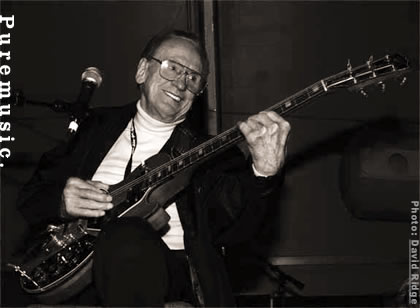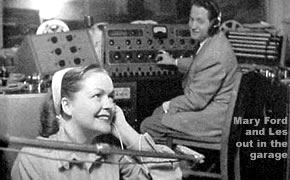
A Conversation with Les Paul (continued)
PM: As a player, you've always been known for having a lively stage presence.
LP: Starting out as a country player and growing up playing to an audience, I learned to give the people what they want. Stan Kenton and I used to have conversations where he would say, "I'm going to educate the public to good music. That's my goal in life." It was the opposite of my goal. My goal is not to teach anybody anything. Mine is to give them what they wish to hear, and something they can understand without having a book and or having to study picking technique. They paid to get in. Give 'em their money's worth.
PM: But certainly you had a lot of technique that musicians could appreciate.
LP: Sure. You don't want to be held back because of a lack of technique. Technique is practice. But technique is not where it's at. Where it's really at is what you do with what you got. The key to it is to say something with your instrument, so it's like a conversation. You're getting a message across. If the fellow you're speaking to is very intelligent, you can get more technical. But if he's not particularly intellectual, you try to talk to him on his terms.
PM: Your solo on Bing Crosby's "It's Been a Long, Long Time" is wonderfully expressive. How did you develop your phrasing?
LP: There was a typical case of you don't have to play a lot of notes, you just have to play the right notes. And that tells the whole story. When we got done playing the number, Bing was the first man to ever kiss me. [laughs] He came over and said, "Great!" All I was really doing was replacing Eddie Lang, who was my mentor. Bing was a sucker for guitar, and that particular song was one that didn't need a lot of technique to say what it should say.
[There's an audio clip of "It's Been a Long, Long Time" on the Listen page, in a selection of clips of Les Paul recordings from several eras.]
PM: Bing gave you the first Ampex tape recorder in 1949. How soon after did you think of putting an extra recording head on it?
LP: I would say ten minutes. [laughs] I was busy recording with the recording lathes, with the discs. While I was doing that, I was thinking about how to modify the Ampex. I took a paper and a pencil and wrote down my ideas. The next day, Mary and I were on our way to Chicago. I told her that we didn't have to come back to L.A. to do our radio shows anymore. We could do them in garages, motel rooms, filling stations--we could make them anyplace with my new invention. I showed her the tape machine. She was very doubtful about the whole idea. When we got to Chicago, I hooked up the extra head, and as a test, recorded Mary's voice, then my guitar. They were both on there. I said, "By God, it works!" Mary and I were dancing around the room. We went to work that night the two happiest people in the world.
PM: Back in L.A., you built the first home studio.
LP: I built it in the garage in my backyard and put the word out that I would record anybody--for free. [laughs] I wanted to learn all the tricks of recording. So I'd have a little jazz trio come over. They'd play and I'd concentrate on the fidelity and getting the acoustics just right. I'd take carpet out, slant the walls, change the room materials, experiment with mic placement--all the technical things.

PM: Your first big breakthrough in multi-track recording was your own record "Lover."
LP: I just locked myself out there in that garage and said, "I'm going to make a sound where people will be able to tell me from everybody else. Something new, something fresh." I used slap-back echo and reverb, I sped up tracks--all the things I had at my command. I went in with that idea, and lo and behold, when I found it, I was very excited. After I made "Lover," we were at a garage party with Artie Shaw and the actor Laurence Tierney. They were smoking pot, and they had a record changer there, and I slipped my record in amongst theirs. When mine came up, Artie said, "What in the world is that?!" The others flipped out, and Mary said, "That's Les!"
But oddly enough, the very first person to hear it was W.C. Fields. He came to my garage to make a comedy record. When I played it for him, he said "My boy, you sound like an octopus." [laughs]
PM: Are you currently working on any new inventions?
I've had quite a bit of ear damage over the years, and have to wear hearing aids. Of course, I'm around people, from Walter Cronkite to Bill Clinton to my barber, and they're all complaining about the same thing. That the damned hearing aid--which is a million times better than what Edison had--is still not perfect. So I've gotten into modifying it, and we're now coming out with a Les Paul hearing aid. What I like about it is that a Stradivarius sounds like a Stradivarius and a kazoo sounds like a kazoo. If I can contribute just one more thing in this world before I go, it's going to be with hearing, and help the many people that have that curse. continue
print (pdf) listen to clips puremusic home